The Music of Pakistan includes diverse elements ranging from music from various parts of South Asia as well as Central Asian, Middle Eastern, and modern-day Western popular music influences. With these multiple influences, a distinctive Pakistani music has emerged.

Sindhis are an Indo-Aryan ethnolinguistic group who speak the Sindhi language and are native to the Sindh province of Pakistan. The historical homeland of Sindhis is bordered by the southeastern part of Balochistan, the Bahawalpur region of Punjab and the Kutch region of Gujarat. Having been isolated throughout history, unlike its neighbours, Sindhi culture has preserved its own uniqueness.
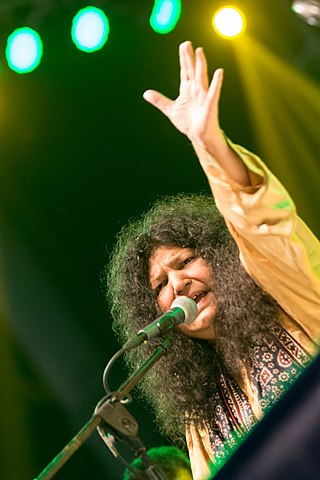
Abida Parveen is a Pakistani singer, composer and musician of Sufi music. She is also a painter and entrepreneur. Parveen is one of the highest paid singers in Pakistan. Her singing and music has earned her many accolades, and she has been dubbed as the 'Queen of Sufi music'.

Pakistani folklore encompasses the mythology, poetry, songs, dances and puppetry from Pakistan's various ethnic groups.

Allan Fakir or Allan Faqir, was a Sindhi folk singer from Sindh, Pakistan. He was particularly known for his ecstatic style of performance, marked with devotional rhetoric and Sufi dance-singing.
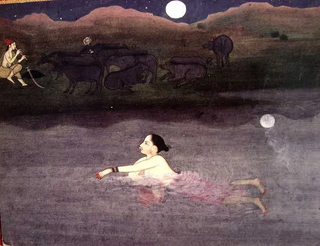
Sohni Mahiwal or Suhni Mehar is one of the seven popular tragic romances of Sindh. The other six are Umar Marvi, Momal Rano, Sassui Punnhun, Lilan Chanesar, Sorath Rai Diyach, and Noori Jam Tamachi. In Punjab, it is four of the most popular romances. The other three are Heer Ranjha, Sassui Punnhun and Mirza Sahiban.
Punjabi dances are an array of folk and religious dances of the Punjabi people indigenous to the Punjab region, straddling the border of India and Pakistan. The style of Punjabi dances ranges from very high energy to slow and reserved, and there are specific styles for men and women.
Music from Sindh, is sung and is generally performed of 5 genres that originated in Sindh, the first genre "Baits" styles. The Baits style is vocal music in Sanhoon or Graham. Second Waee instrumental music is performed in a variety of ways using a string instrument. Waee, also known as Kafi, other genres of Sindhi music are Lada/Sehra/Geech, Dhammal, Dohiraa, Bhagat, Kalaam, Classical. Today other modern genres are also being introduced.

Saieen Zahoor Ahmed or Ali Saain Shafiu is a leading Punjabi Sufi musician from Pakistan. He has spent most of his life singing in Sufi shrines, and didn't produce a record until 2006, when he was nominated for the BBC World Music awards based on word of mouth.
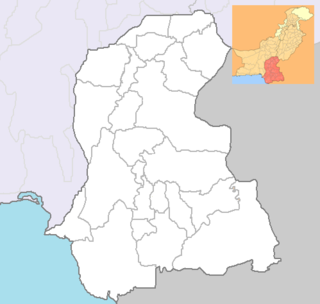
The Culture of Sindh has its roots in the Indus Valley civilization. Sindh has been shaped by the largely desert region, the natural resources it has available, and continuous foreign influence. The Indus or Sindhu River, which passes through the land, and the Arabian Sea also supported the seafaring traditions among the local people. The local climate also reflects why the Sindhis have a language, folklore, traditions, customs, and lifestyle that are so different from the neighbouring regions. The Sindhi culture is also practised by the Sindhi diaspora.
Pakistani folk music refers to the local genre of folk music that originates from Pakistan.
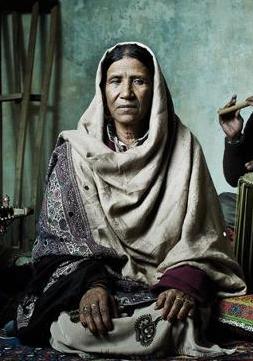
Zarsanga or Zar Sanga (born 1946 in Lakki Marwat) is a Pashto singer from Khyber Pakhtunkhwa, Pakistan. She began her singing career singing for Radio Peshawar and some television programmes, and later went on to perform in Europe, the United States and the UAE. Her extensive career as a singer and performer has earned her the sobriquet "The Queen Of Pashtun Folklore" and the Pride of Performance Award.
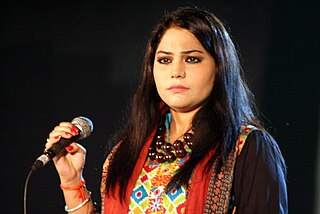
Sanam Marvi is a Pakistani folk and sufi singer. She sings in Sindhi, Punjabi, and Balochi languages.

Saif Samejo is a musician and founder, lead vocalist and songwriter of the Pakistani Sufi folk band The Sketches. In May 2014 he opened the first music Aashram (School) in Hyderabad, Sindh named as "Lahooti Music Aashram". He composed music for Dastan-e Momal Rano on the show Coke Studio.
Mai Dhai is a Pakistani classical singer hailing from Tharparkar, Sindh. She formed a folk-band called Mai Dhai Band composed of Jamal Shab, a harmonium player and dhol player, Muhammad Fakir. Mai and her band has performed in US at SXSW Music 2015, where her music style was met with extravagant positive response. She rose to prominence on national television after appearing as a featured artist in eight season of music series Coke Studio.

Jalal Chandio was a Sindhi folk singer. He was born in 1944 in the village of Harpal Jo Hat, Misri Wah, near Phul Naushahro Feroze District. He was the only expert of yaktara & Chapri at the time, and his singing style made him popular among Sindh and all of Pakistan. He died on 10 January 2001 due to kidney failure. He got lot of respect in all over Sindh as folk singer due to distinct style of playing folk music and singing.
Ustad Manzoor Ali Khan was a Pakistani singer belonging to the Gwalior gharana singing style, one of the oldest singing traditions in Hindustani classical music. Born in Shikarpur, Sindh, Pakistan, he was the first classical musician of the twentieth century who knew about the regional music of Sindh.

Sindhi Cultural Day is a popular Sindhi cultural festival. It is celebrated with traditional enthusiasm to highlight the centuries-old rich culture of Sindh. The day is celebrated each year in the first week of December on the Sunday. It's widely celebrated all over Sindh, and amongst the Sindhi diaspora population around the world. Sindhis celebrate this day to demonstrate the peaceful identity of Sindhi culture and acquire the attention of the world towards their rich heritage.
Kamla Keswani was an Indian folk and playback singer. She was one of the popular Sindhi language singers of India.
Folk dances of Sindh are the traditional dances of the Sindhi people, which are indigenous to Sindh region which is now in Pakistan. These dances are performed at various events including marriages, ceremonies, special occasions, on birth of a child and for cultural purposes.












